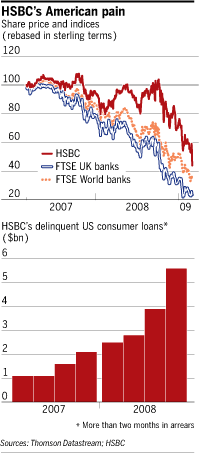HSBC
Roula Khalaf, Editor of the FT, selects her favourite stories in this weekly newsletter.
This may be the UK’s largest rights issue but has HSBC actually done enough? Two numbers leap out: first, the $21.4bn of unrealised losses on debt securities available for sale, a ninefold increase on the previous year; and second, the $34.3bn gulf between the carrying value and fair value of receivables at Household, the US subprime lender that HSBC has shoved into run-off.

HSBC is bullish on both, citing its stress tests and experience with extracting value from run-offs. But, together, these two unknowns could dwarf the $17.7bn it is now raising. HSBC is therefore still far from being able to draw a line under Household, even if it on Monday wrote off all goodwill tied to the bitterly regretted 2003 acquisition.
HSBC makes much of its “signature financial strength”. Indeed, it could absorb $30bn of losses and still retain a tier one capital ratio of 7.5 per cent. But that measure now carries little credibility.
If it did, investors would have piled in to buy “well-capitalised” banks such as Citigroup. As an indicator of a bank’s ability to survive without further capital, investors rightly now put more focus on tangible common equity as a proportion of tangible assets.
By this measure, HSBC is hardly the fortress of its own mythology, except relative to most other banks. Knight Vinke, the activist investor, believes this ratio, 2.8 per cent after the capital raising, could fall below 1 per cent in the extreme scenario in which all $56bn of losses crystallise.
There is room for real caution, reflected in the 19 per cent fall in HSBC shares on Monday. If US house prices, already down 25 per cent, suffer a peak-to-trough fall of 40 per cent and if US unemployment cruises into double digits, further losses at Household might well be substantial.
And, as HSBC reiterated its intention to stand behind bondholders in Household, even though its debts are non-recourse, its shareholders are firmly on the hook for the US subsidiary’s liabilities. The decision not to put the whole sorry Household business into Chapter 11 exposes HSBC shareholders to future losses and cash calls of unknowable size. Talk about crosses to bear.
To e-mail the Lex team confidentially
click here
OR
To post public comments
click here
The Lex column is now on Twitter. To receive our daily line-up and links to Lex notes via Twitter, click here
_________________________________________
Lex is the FT’s agenda-setting column, giving an authoritative view on corporate and financial matters. It is also one of the few parts of FT.com available only to Premium subscribers. This article is provided for free as an example. A Premium subscription gives you unlimited access to all FT content, including all Lex articles and the FT mobile Newsreader.
If you have questions or comments, please e-mail help@ft.com or call:
US and Canada: +1 800 628 8088
Asia: +852 2905 5555
UK, Europe and rest of the world: +44 (0)20 7775 6248
Comments